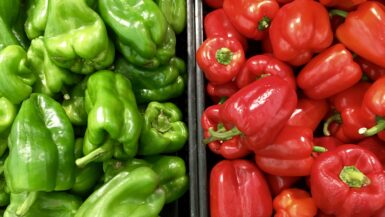Eating seasonally refers to consuming foods that are currently in season in your region. This practice has been gaining popularity in recent years due to its numerous benefits for both our health and the environment. When we eat seasonally, we are not only supporting local farmers and reducing our carbon footprint, but we are also consuming foods that are at their peak in terms of flavor and nutrition. In this article, we will explore the many benefits of eating seasonally and provide tips on how to incorporate seasonal foods into your diet.
What does it mean to eat seasonally?
Eating seasonally means consuming fruits and vegetables that are grown and harvested within their natural growing season. This means that the produce is fresh and has not been stored for long periods of time or transported from faraway places. When we eat seasonally, we are eating foods that are at their peak in terms of flavor, nutrition, and quality.
Seasonal eating is not a new concept. Our ancestors ate seasonally because they had no other choice. With modern technology and transportation, we can now have access to any type of produce year-round. However, this convenience comes at a cost to our health, the environment, and our wallets.
By eating seasonally, we can support local farmers, reduce our carbon footprint, and improve our health. It also allows us to reconnect with the natural rhythms of the earth and appreciate the unique flavors and textures of each season’s bounty.
The environmental benefits of eating seasonally
Eating seasonally has numerous environmental benefits. When we eat foods that are in season, we are supporting local farmers who grow their crops using sustainable agricultural practices. This means fewer pesticides, herbicides, and fertilizers are used, which reduces the amount of chemicals that end up in our soil and waterways. Additionally, local farmers do not have to transport their products over long distances, which reduces the carbon emissions associated with transportation.
When we eat non-seasonal foods, we are often consuming produce that has been grown in other countries and shipped to our supermarkets. This transportation process requires a significant amount of energy and contributes to greenhouse gas emissions, which contribute to climate change. By eating seasonally and locally, we can reduce our carbon footprint and support sustainable agricultural practices.
Eating seasonally can also help to reduce food waste. When we eat foods that are out of season, they often have to be transported from faraway places and stored in refrigerated warehouses for long periods of time. This can lead to spoilage and waste. When we eat seasonally, we are consuming foods that are fresh and have not been stored for long periods of time, which reduces the amount of food that goes to waste.
In conclusion, eating seasonally is not only good for our health and our wallets, but it is also good for the environment. By supporting local farmers who use sustainable agricultural practices and reducing our carbon footprint, we can help to create a healthier and more sustainable food system.
The health benefits of eating seasonally
Eating seasonally can have numerous health benefits. When we eat foods that are in season, we are consuming produce that is at its peak in terms of flavor and nutrition. Fruits and vegetables that are in season are often fresher and have not been stored for long periods of time, which can result in a loss of nutrients.
Seasonal produce also tends to be higher in certain vitamins and minerals. For example, winter squash and sweet potatoes, which are in season in the fall and winter, are high in vitamin A, which is important for eye health and immune function. Apples, which are in season in the fall, are high in fiber, which can help to lower cholesterol levels and improve digestion.
Eating seasonally can also help to diversify our diets. When we eat foods that are in season, we are exposed to a wider variety of fruits and vegetables. This can help to ensure that we are getting a range of nutrients and can help to prevent boredom with our diets.
In addition to the nutritional benefits, eating seasonally can also be a more mindful approach to eating. By paying attention to the foods that are in season, we can reconnect with the natural rhythms of the earth and become more aware of where our food comes from.
Overall, eating seasonally can have numerous health benefits. By consuming fresh, nutrient-dense produce that is at its peak in terms of flavor and nutrition, we can improve our overall health and well-being.
The economic benefits of eating seasonally
Eating seasonally can also have economic benefits. When we eat foods that are in season, we are supporting local farmers and the local economy. By purchasing produce from local farmers, we are keeping money within our community and supporting small businesses.
In addition, seasonal produce is often less expensive than non-seasonal produce. When fruits and vegetables are in season, there is often an abundance of them, which can lead to lower prices. This can make eating healthy more affordable and accessible for everyone.
Eating seasonally can also help to reduce our overall food expenses. When we eat non-seasonal foods, we often have to pay more for them because they have to be transported from faraway places and stored in refrigerated warehouses. This can result in higher prices for the consumer. When we eat seasonally, we are consuming foods that are grown locally and do not require as much transportation or storage, which can reduce the cost for the consumer.
Finally, eating seasonally can also help to reduce food waste, which can save us money in the long run. When we eat foods that are in season, they are often fresher and have not been stored for long periods of time, which can lead to spoilage and waste. By reducing food waste, we can save money on groceries and help to create a more sustainable food system.
In conclusion, eating seasonally can have numerous economic benefits. By supporting local farmers, reducing food waste, and consuming foods that are less expensive, we can create a more affordable and sustainable food system that benefits everyone.
How to eat seasonally on a budget
Eating seasonally doesn’t have to be expensive. In fact, it can be a great way to save money on groceries. Here are some tips on how to eat seasonally on a budget:
1. Shop at farmers markets
Farmers markets are a great place to find seasonal produce at a lower cost. When you buy directly from the farmer, you are cutting out the middleman and reducing the cost of transportation and storage. In addition, farmers markets often have a wider variety of produce, which can help to diversify your diet.
2. Join a Community Supported Agriculture (CSA) program
A CSA program allows you to buy a share of a local farm’s produce for a set price. This can be a cost-effective way to get fresh, seasonal produce throughout the year. In addition, many CSA programs offer a variety of fruits and vegetables, which can help to keep your diet interesting.
3. Plan your meals around seasonal produce
By planning your meals around seasonal produce, you can save money on groceries and reduce food waste. Look for recipes that feature seasonal produce and plan your meals accordingly. This can help you to avoid buying non-seasonal produce that is more expensive.
4. Buy in bulk and freeze
When fruits and vegetables are in season, they are often less expensive. Take advantage of this by buying in bulk and freezing the excess. This can help you to save money on groceries throughout the year and ensure that you always have fresh produce on hand.
5. Compare prices
Compare prices of seasonal produce at different stores and farmers markets. Prices can vary significantly, so it pays to shop around. Look for sales and discounts on seasonal produce to get the best deals.
In conclusion, eating seasonally can be an affordable and healthy way to eat. By shopping at farmers markets, joining a CSA program, planning your meals around seasonal produce, buying in bulk, and comparing prices, you can eat seasonally on a budget and enjoy the many benefits of seasonal eating.
The best seasonal foods to eat in each season
Eating seasonally means enjoying the best produce that each season has to offer. Here are some of the best seasonal foods to eat in each season:
Spring
– Asparagus
– Artichokes
– Peas
– Radishes
– Rhubarb
– Strawberries
Summer
– Berries (blueberries, raspberries, blackberries)
– Cherries
– Corn
– Cucumbers
– Eggplant
– Melons (watermelon, cantaloupe)
– Peaches
– Tomatoes
Fall
– Apples
– Beets
– Broccoli
– Brussels sprouts
– Carrots
– Cauliflower
– Cranberries
– Grapes
– Pears
– Pumpkins
– Sweet potatoes
– Winter squash
Winter
– Citrus fruits (oranges, grapefruits, lemons)
– Kiwi
– Pomegranates
– Root vegetables (carrots, parsnips, turnips)
– Squash (acorn, butternut)
– Tangerines
Incorporating these seasonal foods into your diet can help you to enjoy fresh, flavorful produce that is at its peak in terms of nutrition. Remember, this is not an exhaustive list, and there are many other delicious seasonal foods to enjoy throughout the year. By eating seasonally, you can diversify your diet, support local farmers, and enjoy the many benefits of seasonal eating.
How to incorporate seasonal eating into your daily routine
Incorporating seasonal eating into your daily routine can be easy and enjoyable. Here are some tips on how to do it:
1. Start small
Incorporating seasonal eating into your diet doesn’t have to be overwhelming. Start by incorporating one or two seasonal foods into your meals each week. This can help you to gradually build up your knowledge of seasonal foods and recipes.
2. Plan your meals around seasonal produce
Plan your meals around the seasonal produce that is available in your area. Look for recipes that feature seasonal produce and plan your meals accordingly. This can help you to avoid buying non-seasonal produce that is more expensive and less flavorful.
3. Get creative
Experiment with new recipes and cooking techniques to make the most of seasonal produce. Try grilling, roasting, or sautéing seasonal vegetables to bring out their natural flavors. Use seasonal fruits to make desserts or smoothies.
4. Preserve seasonal produce
Preserve seasonal produce by canning, freezing, or dehydrating it. This can help you to enjoy seasonal produce throughout the year and reduce food waste.
5. Shop at farmers markets
Shop at farmers markets to find the freshest seasonal produce. Talk to the farmers to learn about the different types of produce and how to prepare them.
6. Join a Community Supported Agriculture (CSA) program
Joining a CSA program can help you to get a regular supply of seasonal produce throughout the year. This can help you to diversify your diet and support local farmers.
Incorporating seasonal eating into your daily routine can help you to enjoy fresh, flavorful produce that is at its peak in terms of nutrition. By starting small, planning your meals around seasonal produce, getting creative, preserving seasonal produce, shopping at farmers markets, and joining a CSA program, you can make seasonal eating a regular part of your diet.
The impact of non-seasonal eating on the environment and health
Eating non-seasonal foods is not only harmful to the environment but also to our health. The demand for out-of-season foods has led to the use of chemicals and preservatives to extend the shelf life of fruits and vegetables, and the transportation of these foods over long distances results in significant carbon footprints.
Environmental impact
The transportation of non-seasonal foods requires significant amounts of energy, which results in the emission of greenhouse gases. The use of pesticides and fertilizers to grow these foods also has a negative impact on the environment. The chemicals used in these processes can contaminate soil and water, affecting the health of animals and humans.
Moreover, when we eat foods that are out of season, we are supporting a food system that is heavily reliant on fossil fuels. This system contributes to climate change and the degradation of ecosystems, as well as the loss of biodiversity.
Health impact
Non-seasonal foods are often picked before they are ripe and transported over long distances. This means that they may have fewer nutrients than foods that are in season. Additionally, the use of preservatives and chemicals can have harmful effects on our health.
Furthermore, the consumption of non-seasonal foods can lead to a lack of diversity in our diets. When we eat the same foods year-round, we miss out on the unique nutrients that come with seasonal foods. This can lead to nutrient deficiencies and health problems.
The cultural significance of seasonal eating
Seasonal eating has long been a part of cultural traditions around the world. Many cultures celebrate the seasons through special meals and feasts that feature foods that are in season. Eating seasonally can also help us connect with our local food systems and the communities that produce our food.
Cultural traditions
Many cultures have special celebrations and traditions that revolve around seasonal foods. For example, in Japan, cherry blossom season is celebrated with picnics under the blooming trees and foods that feature cherry blossoms. In Italy, the summer solstice is celebrated with a feast of grilled vegetables and fruits. In India, the festival of Holi is celebrated with foods that feature spring vegetables like peas and asparagus.
These cultural traditions not only celebrate the seasons but also help to preserve local food systems and traditional recipes. Eating seasonally can help us connect with our heritage and the foods that our ancestors ate.
Local food systems
Eating seasonally can help to support local food systems and the communities that produce our food. When we buy foods that are in season and locally grown, we are supporting small-scale farmers and reducing our carbon footprint. We are also getting the freshest and most nutritious foods possible.
Moreover, by eating seasonally, we are helping to preserve local food traditions and biodiversity. Many traditional foods and heirloom varieties are only available during certain seasons, and by eating them, we are helping to keep these foods and traditions alive.
Conclusion
Eating seasonally is not only good for our health and the environment but also for our cultural heritage. By celebrating the seasons through food, we can connect with our local food systems and the communities that produce our food. We can also help to preserve traditional foods and recipes, and support small-scale farmers. So, the next time you sit down to a meal, think about the season and the foods that are in season. You might just discover a new tradition or recipe that connects you to your cultural heritage.





Leave a reply